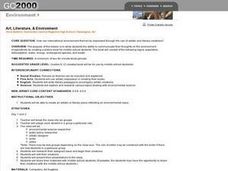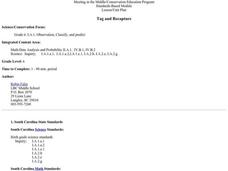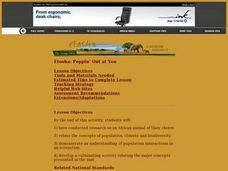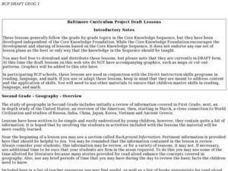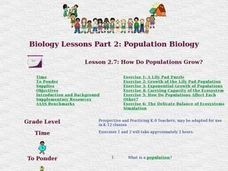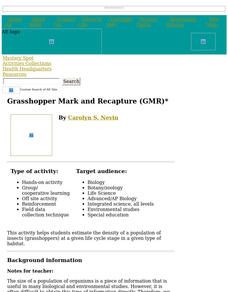Curated OER
Art, Literature, & Environment
High schoolers communicate their thoughts on the environment by creating picture books for middle school students. High schoolers include their thoughts on population, deforestation, water, energy, endangered species, and waste in their...
Curated OER
World Population Activity II: Excel
Students import UNEP World population data/projections from either the World Population Prospects: The 2002 Revision Population Database - UN Population Division or a text file. They graph this data by itself, and then along with...
Curated OER
World Population Activity I: Excel
Students use Excel to explore population dynamics using the Logistic equation for (S-shaped) population growth. This activity is primarily intended as an introductory tutorial on using Excel.
Curated OER
Genetic Drift
Students use a mathematical simulation of genetic drift to answer questions about the factors that influence this evolutionary process. They run a series of simulations varying allele frequency and population size and then analyze their...
Curated OER
Population and Air Pollution
Students conduct Internet research to compare the impact of increasing populations and how it affects air pollution in both, the USA and Russia. Students present their finding in a creative manner by developing brochures, bumper...
Curated OER
World in the Balance
Students explore population growth. They calculate how long it takes a country's population to double in size and to investigate factors affecting growth rate. In addition, they list of factors they think might affect growth rate
Curated OER
How Many Animals?
Learners use their math skills to develop estimates for the population of several animal species native to the Austrailian rainforest. It is a simulation that researchers at the Center for Rainforest Studies in Australia perform to...
Curated OER
Tag and Recapture
Sixth graders participate in an activity in which colored jelly beans represent fish in a lake--10 green jellybeans per "lake" representing tagged fish. They draw from the beans (fish) and record the number of tagged fish they draw...
Curated OER
Etosha: Poppin' Out at You
Tenth graders research an African animal of their choice and relate the concepts of population, climate and biodiversity to their animal. They examine how population interacts in an ecosystem.
Curated OER
Geography Lesson 1
Middle schoolers examine relationship between population centers and sports teams, explore influence of weather on attendance, and research influence of geography, traffic flow and disposable income on site selection for sports stadiums.
Curated OER
How Do Populations Grow?
Students examine how populations grow and how invasive species can affect the balance of ecosystems. They simulate the growth of lily pads, analyze and record the data, and simulate the results of an invasive species on an ecosystem.
Curated OER
GLOBAL WARMING
Students form definitions of the greenhouse effect based on prior knowledge, class discussion, viewing diagrams, and participate in group brainstorming sessions and class discussions related to the impact of the greenhouse effect and...
Curated OER
Progression's Price
Students reflect upon their regional and national environments, analyze causes of environmental problems as well as their implications, and examine effects of population growth as they participate in "The Popcorn Game."
Curated OER
People Are Like Peas in a Pod
Students experiment with pea pods to observe/appreciate the diversity of individuals within a population, and to explain of how dominant and recessive traits, genotypes, and phenotypes help produce variation in a population.
Curated OER
Planet Earth: Almost 6 Billion Served
Young scholars investigate the global population explosion, by comparing India's and China's population control efforts and results. They interpret the UN's Human Development Report, and conduct research on another highly-populated country.
Curated OER
Grasshopper Mark and Recapture (GMR)
Learners estimate the density of a population of insects (grasshoppers) at a given life cycle stage in a given type of habitat.
Curated OER
A Rewarding Endeavor
Learners develop a survey to find out if people would return an envelope of money they found. Include options for giving it to the police, advertising for the one who lost it. Students place their research in a feature article that...
Curated OER
Ecosystems
Your students will definitely understand what the word ecosystem means after viewing this slide show. The word ecosystem is broken down to its root meaning, described with examples, and then defined by the factors that comprise it. Note:...
Curated OER
Ecology
Explore the rainforest with this fact building PowerPoint. With 11 slides filled with biome images, this would work well with a lecture about the different types of ecosystems. Pictures of the desert, rain forest, and forest are identified.
Curated OER
Human Population Growth in the Future, What are We Going to Do?
Students predict what will happen to human population in the future. For this biology lesson, students brainstorm possible solutions to overpopulation problems. They create a persuasive brochure about their views on this issue.
Curated OER
Pop Quiz
In this geography skills practice worksheet, students respond to 12 multiple choice questions about world population statistics.
Curated OER
Populations – The Survival of the Fittest (Part 1)
Students explain in their own words why organisms live together. In this biology instructional activity, students model what happens to organisms if their environment changes. They explain the importance of evolution.
Curated OER
Lights On ! Lights Off! Exploring Human Settlement Patterns
Third graders write informational paragraphs based on the settlement patterns of the United States. For this settlement lesson plan, 3rd graders read about population and how it affects where people settle next.
Curated OER
Brain Teaser - Population
In this logic worksheet, learners solve a word problem using logic about the percentage of population of the French who speak English. Students complete 1 problem.


